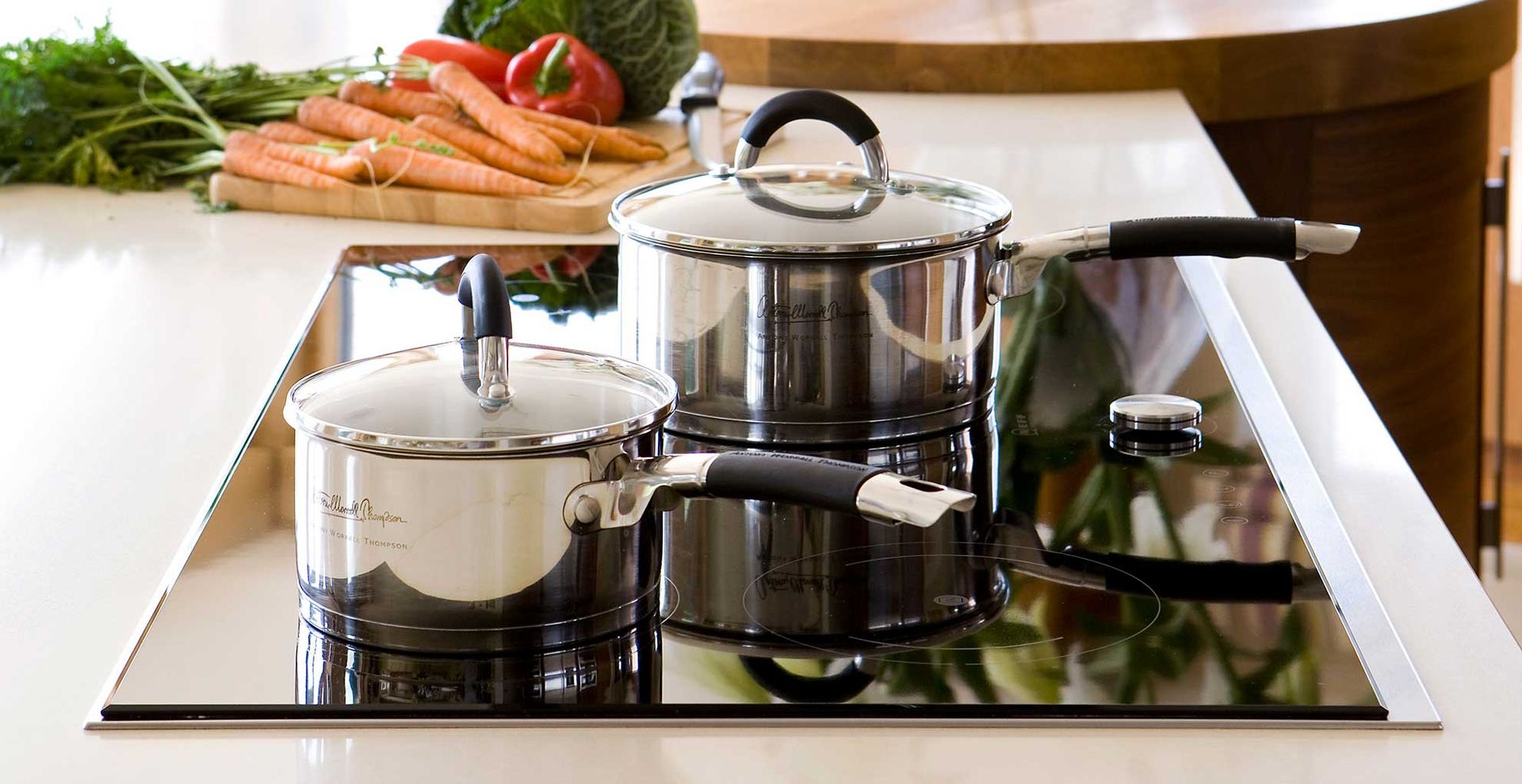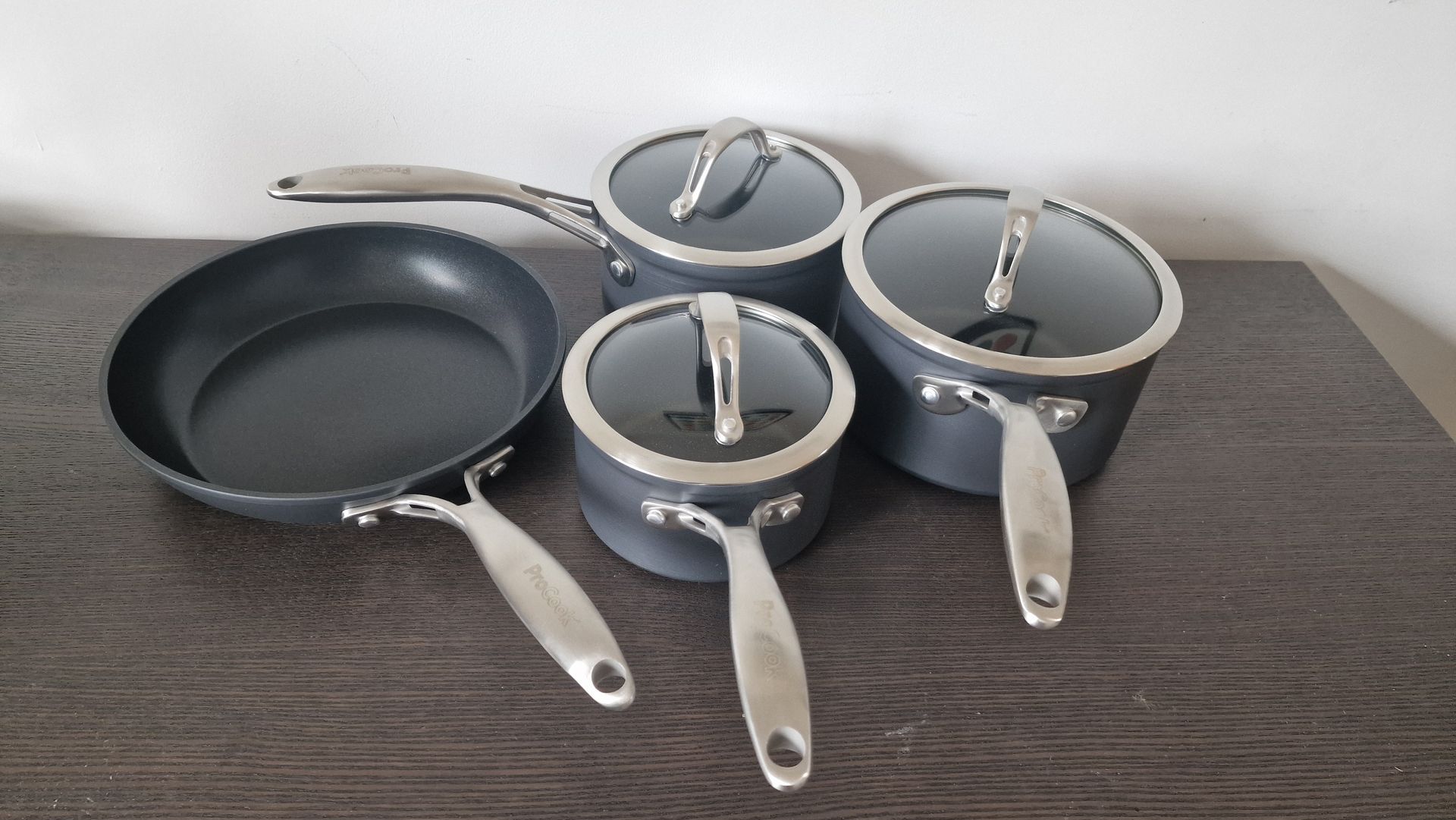[ad_1]
Cooking on induction is bigger than ever, with demand for gas stoves falling rapidly in comparison. But how do induction hobs work and is this method of cooking worth the hype? According to our team of experts, the answer is a resounding yes.
When remodelling or choosing a new kitchen design trend when it comes to choosing a hob, it’s not just about deciding between gas and electric – there’s a third option, induction, which promises the best of both worlds. With an induction hob, you get the power and control of gas with the convenience and easy cleaning of electric hobs.
If that sounds too good to be true, it really isn’t – induction hobs are brilliant. “I bought my first induction hob a decade ago and haven’t looked back,” says our kitchen design expert Linda Clayton, who researched everything you need to know before buying an induction hob. “I was upgrading from an extremely neurotic, possibly dangerous, gas hob at the time. It wouldn’t be an exaggeration to say the switch transformed my cooking enjoyment levels by 100%. Total game-changer.”
However, there are a few things you need to know about how inductions work and why they are so beloved by chefs and kitchen designers alike.
How does an induction hob work?
If you’re still a little stumped about what induction is or how an induction hob works never fear, to make it clear, w&h’s resistant cooking expert and pan tester Jessica Ransom is on hand to explain how it works.
“An induction hob is when electricity is passed through copper coils in the hob. This creates a magnetic field. When a pan with a magnetic base is placed directly on top of the hob the magnetic field causes the pan to heat up. This is how induction hobs and the best induction pans work together.”
This method of heating causes much less energy loss. How induction works is by creating kinetic energy which is where it takes its heat from. It’s really good for the environment because there is much less lost energy. It controls the energy to where it is needed, and it saves money – a brilliant sustainable living solution for kitchens.

(Image credit: Future)
What are the benefits of induction hobs?
Induction hobs are very efficient, very fast and very safe – they don’t get hot like other hobs do, so you’re less likely to burn yourself on them (more on that below).
Induction hobs use specialist technology, which generally offers a better user experience when compared to gas or electric. Nina Matsunaga, chef patron at the Black Bull in Sedbergh, Cumbria, told w&h, “Increasingly induction pans are making an appearance in the home, especially as induction systems are superior to gas or electric when it comes to overall cooking. And in addition, they are faster, cleaner, and waste infinitely less heat.”
- Safety: In the induction hob vs gas hob debate, this is where induction may win out. The induction hob itself does not become hot. This means that unless an induction-specific pan is placed on top of the hob it will not heat up, thus removing a potential safety hazard. Richard Bramble, a chef who runs a fine dining private catering, Bramble Dining, confirmed this, saying, “When you’re cooking on inductions you don’t get any referral heat. It stays directly at the bottom of the pan so the handle of a frying pan or saucepan will never get hot, which minimizes the risk of you burning yourself while you’re cooking. It’s also safer if a child reaches up and puts their hand on it—you know they’re not going to burn themselves.” Plus, given that it is the pan that heats up, once this pan is removed the hob will lose any of the residual heat quickly and return to cold (even if it is left on).
- Efficiency when cooking: Induction cookers heat up very quickly, meaning your cooking will be very efficient. Multiple pans reached maximum temperature in less than a minute. The key is that less energy is wasted on heating the surroundings (the outside of the pan or the base of the hob). Instead, only the inside of the pan is heated. The best pans for induction hobs only work to improve this efficiency.
- Efficiency when cleaning: Given that induction hobs only heat the pan and not the hob, it is very rare for food to burn onto the hob itself. This reduces the time spent cleaning and means only a damp cloth is required—though a glass cleaner every couple of months doesn’t go amiss.
- More precise and even temperature control: Induction pans and hobs allow you to control the temperature at which your food cooks instantly, meaning if something is heating too quickly or too slowly, you can rectify any cooking mistake within seconds. Nina Matsunaga explained further, “Induction pans transfer heat, really, well without wasting energy, so they’re useful for cooking pretty much anything. They’re especially good when cooking eggs and fish and for searing meat evenly.”

A ProCook saucepan set ready to test on induction
(Image credit: Future)
Do I need special induction pans for an induction cooker?
Not necessarily. Any pot or pan that’s made from a ferrous material – cast iron skillets, many stainless steel pans and anything a magnet will stick to – will work fine, and many pots and pans made from non-ferrous materials have a plate on the bottom that makes them suitable for induction hobs. Without such plates, copper, glass, aluminium or hard anodised pots and pans won’t work.
If you like to stir fry, you might need a new wok – traditional woks have curved bottoms, which are great for use over gas burners, but they’re not good for induction. You’ll need a flat-bottomed wok instead.
If you’re unsure whether every type of pan every enthusiastic cook needs will work, you can see what happens if you bring a fridge magnet to the bottom of the pan – if it doesn’t stick, then the pan probably won’t work. If you don’t have a magnet, many manufacturers print a coil icon on their pans to show they’re induction-compatible.
Are there any other considerations for induction cookware?
Be careful with your best non-stick pans and cookware, because induction hobs can make them much hotter than they’re designed for. Non-stick coatings are usually made to withstand temperatures of up to 260ºC. Induction cooking can achieve temperatures of 300ºC.
Are induction cookers cheaper to run than gas or electric?
Induction cookers are much more efficient than gas cookers – around 80%-90% of their energy goes straight to heat your food compared with around 50% for gas and 60% for standard electric hobs. They’re faster, too, so you can boil water much more quickly than with other kinds of hobs. However, that efficiency isn’t going to slash your electricity bills dramatically because of the overall rising costs of both gas and electricity right now.
[ad_2]
Source link